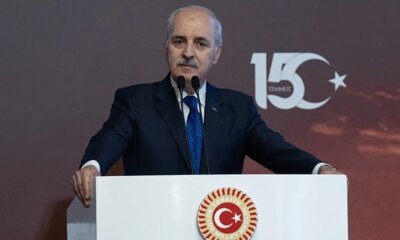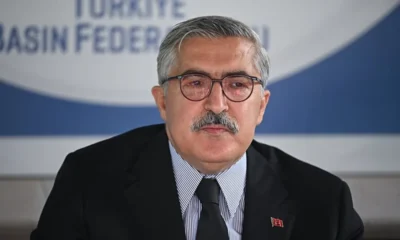Economy
EU eases Schengen access for Turks, urged to revive visa-free talks
The European Union has eased rules for Turks to use its open-border Schengen area, the bloc’s ambassador to Ankara announced on Friday, calling for the urgent revival of negotiations on visa-free travel for Turks.
Turkish Trade Minister Ömer Bolat confirmed that the European Commission has issued a new document aimed at facilitating and accelerating Schengen visa procedures for Turkish citizens and has shared it with EU member states.
For years, Turkish citizens and businesses have complained about the EU’s visa system. The EU has argued the processes – managed by accredited visa agencies – have been slow due to the high number of applications and that it was discussing possible workarounds with Ankara.
The new guidelines allow for longer-term, multiple-entry visas to be issued to Turkish nationals who have previously obtained a Schengen visa and traveled regularly without overstaying.
Bolat recalled the difficulties Turkish citizens have faced in recent years, including long appointment wait times, the issuance of very short-term visas and high rejection rates.
These concerns have been consistently raised with EU officials at all levels, including the European Commission, the European Council and bilateral meetings with member states, he said in a statement on Friday.
Multiple-entry visa pathway
Ambassador Thomas Hans Ossowski said the new rules would help address Turks’ complaints over long bureaucratic processes, but warned it was not enough to permanently solve the problems.
“It will be much easier and much faster for Turkish citizens,” Ossowski told reporters in Ankara, referring to the European Commission’s new decision, in effect since July 15, simplifying the path to multiple-entry visas for Turks.
Turks who previously used visas correctly will be eligible for a six-month visa as early as their second application, followed by one-year, three-year and five-year multiple-entry visas.
Türkiye has been an EU membership candidate since 1999 but its accession process has been frozen for years over multiple disagreements, including the prolonged process of expansion of the scope of the customs union agreement, maritime issues with Greece and Greek Cyprus, and EU policies on Syrian refugees.
There have recently been signs of increased engagement and economic cooperation.
Renewed push for visa-free travel
Ossowski said the EU had for more than a decade offered Türkiye the prospect of visa-free travel and stressed the need to return to the liberalization process.
Negotiations for visa-free travel between the EU and Türkiye began in 2016 but yielded no results.
“Every other candidate country has visa-free travel except Türkiye,” he said. “It is urgent to re-engage in this process of visa-free travel in the Schengen space and the EU,” Ossowski added.
The Commission is ready to restart formal negotiations after the summer and work with Ankara on fulfilling the six remaining benchmarks required by the visa liberalisation roadmap, he said.
“We are ready, the Commission is ready to work closely with Turkish authorities,” he said.
Diplomatic engagement
Bolat said, Türkiye has pursued a positive agenda with the EU, initiating a high-level trade dialogue and holding key meetings in both Ankara and Brussels to begin removing barriers in bilateral relations.
“We have always reminded EU authorities and member states that visa liberalization is a right granted to Turkish citizens under international agreements,” he noted.
“In the meantime, while we await the removal of visa restrictions, we have stressed the need for practical solutions: shortening appointment times for business, tourism, transport and education-related travel, and improving the capacity of EU embassies and consulates in Türkiye.”
He noted that EU officials have acknowledged Türkiye as the second-largest recipient of Schengen visas globally – after China – with over 1 million visas issued annually and an average rejection rate of around 15%.
The latest round of detailed discussions took place on July 1 during the Türkiye-EU High-Level Trade Dialogue in Ankara.
According to Bolat, EU officials informed them during those talks that a new visa facilitation scheme was in the works.
“We are pleased to see that the European Commission has finalized and circulated this document to member states as of yesterday,” he said. “It envisions longer-term, multiple-entry visas for Turkish citizens who have demonstrated regular and reliable travel behavior, with no migration or security risk.”
“This is an important and positive development for our citizens in terms of tourism, business, trade, investment, education, academia, and civil society engagements.”
‘No excuse’
Bolat stressed that embassies and consulates of the 25 Schengen countries “no longer have any excuse” to delay the process.
“To accelerate this implementation, we urge urgent upgrades to consular infrastructure, including buildings, staffing, and IT systems,” he added. “The European Commission has responded positively to our calls, officially launching the process for issuing long-term, multiple-entry visas through this new directive to member states.”
“This is a major step that will enhance cooperation between Türkiye and EU countries in trade, education, tourism, culture and investment,” Bolat said, calling visas a “physical barrier to the movement of people” that is now being eased.
Bolat also stated that efforts will continue to ease and expedite procedures for first-time visa applicants.
“We believe this facilitation and acceleration process will soon apply to first-time applicants as well, provided that everyone complies with the updated regulations,” he said.
Customs union expansion
Looking ahead, Bolat reiterated that Türkiye expects progress in expanding and modernizing the EU-Türkiye Customs Union to include services and e-commerce.
“The Commission has already recommended the start of negotiations. The matter now rests with the European Council. Once approval is granted, we are ready to begin talks immediately – and so is the Commission,” he concluded.
First implemented in 1995, the Türkiye-EU Customs Union has helped boost economic ties. But business groups have long argued that the agreement is outdated and ill-suited for today’s trade environment.
A host of disagreements over recent years have stalled the negotiations. The deeper 1990s-era agreement would be expanded to services, farm goods and public procurement. The current deal only covers a limited range of industrial products.
Türkiye’s total trade volume with Europe – including both EU and non-EU countries – reached $327 billion in 2024, with $149 billion in exports and $178 billion in imports, according to the Foreign Economic Relations Board (DEIK).
Economy
Mastercard, Visa probed in Türkiye over cross-border payment barriers
Türkiye’s competition watchdog on Friday announced it had launched an investigation into global card payment giants Mastercard and Visa to determine whether their scheme rules restricted Turkish payment institutions from servicing merchants based abroad.
The Competition Authority (RK) said domestic payment service providers have been able to offer services to consumers wishing to make payments to merchants based abroad through bilateral agreements established with foreign entities.
“Under these bilateral agreements, cross-border payment transactions are localized and can be carried out without being subject to Mastercard or Visa’s foreign transaction fees,” the board said.
Initial findings from on-site inspections suggest that Mastercard and Visa may be obstructing the operations of payment service providers engaged in such bilateral agreements, claiming these activities violate their self-defined scheme rules, and may be using various methods, such as imposing sanctions on banks, to do so, it noted.
The investigation will examine whether the companies have prevented the use of their card/POS infrastructure by foreign-based merchants and whether they have taken steps to exclude alternative payment solutions from the market, the authority noted.
The board launched a separate investigation in November last year to examine whether Mastercard and Visa’s discount and incentive structures created de facto exclusivity with card-issuing banks in Türkiye, potentially stifling competition from rival networks.
In 2015, Mastercard was fined by for practices related to its card payment systems.
Economy
House sales in Türkiye jump again in June as demand persists
House sales in Türkiye remained robust in June as over 107,000 units were sold nationwide, official data showed on Thursday, reflecting strong demand that comes despite a prolonged period of elevated borrowing costs.
A total of 107,723 homes were sold across the country last month, up 35.8% year-over-year, according to the data from the Turkish Statistical Institute (TurkStat).
The country’s largest and most populous city, Istanbul, once again led the market with 17,656 units sold in June, data revealed.
The capital Ankara followed with 9,428 sales, while the Aegean city of Izmir recorded 5,987 sales. The provinces with least sales were Ardahan with 38, Bayburt with 62 and Hakkari with 81 units, TurkStat said.
New home sales climbed 32% year-on-year to 33,569 units in June, while second-hand sales jumped 37.6% to 74,154 units.
Mortgage-financed sales, meanwhile, surged 112.6% in June compared to a year earlier, totaling 14,484 homes and representing 13.4% of all house sales.
Sales to foreign buyers also rose, with 1,565 homes sold to non-Turkish citizens – an 8.7% increase from last year. Russians, Ukrainians and Iranians accounted for the highest number of foreign purchases.
The provinces with the highest number of house sales to foreigners were the Mediterranean resort of Antalya with 603, Istanbul with 521 and Mersin, also in the south of Türkiye, with 128 units sold last month.
While home sales to foreigners rose slightly in May and June, in the January-June period, cumulative sales to foreigners decreased by 10.6% compared to the same period of the previous year to 9,354 units, the data revealed.
The Turkish housing market has shown resilience and has seen a continued period of strong monthly sales despite tight monetary conditions. The Turkish central bank has kept its key policy rate at 46% after reversing a short-lived easing cycle, as it aims to curb inflation, which has shown to be particularly sticky in the services sector and rents.
Sales in first half of year up 26.9%
TurkStat data also revealed that total house sales, from January through the end of June, reached some 691,893 units, marking a 26.9% increase over the same period in 2024.
Of this, mortgaged sales totaled 103,090 units, which marked an increase of 100.5% compared to the same period last year.
Separate data released by the Turkish central bank on Thursday also showed that the residential property price index (RPPI) ticked up 2% on a monthly basis in June.
The RPPI increased annually by 32.8% in nominal terms and decreased by 1.7% in real terms, the data from the bank revealed.
The regions that saw the highest rise in annual terms were mostly the eastern and southeastern provinces of Erzurum, Erzincan, Bayburt, Ağrı, Ardahan, Kars, Iğdır, Bingöl, Elazığ, Malatya, Tunceli, Van, Bitlis, Hakkari, Muş, alongside the capital Ankara.
At the same time, southwestern and southern provinces such as Aydın, Denizli, Muğla, Antalya, Burdur and Isparta saw the lowest annual change, the Central Bank of the Republic of Türkiye (CBRT) said.
Economy
Study reveals persistent pay gap for immigrants in major economies
Immigrants in Germany, the United States, France and six other countries earn significantly less on average than native-born citizens, research published on Thursday showed.
Other countries include Canada, Denmark, the Netherlands, Norway, Spain and Sweden, according to an international study commissioned by the journal Nature and conducted with the participation of researchers from the Nuremberg Institute for Employment Research (IAB).
Several of the other countries are closing the wage gap in the second generation of immigrants more quickly than Germany.
In Germany, the income gap for the first generation is 19.6%. The main reason for the deficit is not unequal pay for the same work, but rather limited access to better-paid industries, occupations and companies.
Data from 13.5 million immigrants and native workers in nine countries was analyzed for the study.
“Integration is primarily about breaking down structural barriers to access well-paid jobs,” said Malte Reichelt, co-author of the study, from the IAB.
Language support, recognition of foreign qualifications, expansion of professional networks and better information transfer are important for breaking down structural barriers.
In Germany, there is still a wage gap among second-generation immigrants, averaging 7.7%. Descendants of immigrants from Africa and the Middle East, in particular, continue to be disadvantaged.
An international comparison reveals varying degrees of disparity.
The largest wage gaps among the first generation were found in Spain (29.3%) and Canada (27.5%), followed by Norway (20.3%), Germany (19.6%), France (18.9%) and the Netherlands (15.4%).
The differences were significantly smaller in the U.S. (10.6%), Denmark (9.2%) and Sweden (7%).
Income differences are also evident among the second generation, with the wage gap averaging 5.7%, meaning Germany is above average in this respect.
The wage gap is widest among second-generation immigrants in Norway, at 8.7%, and narrowest in Canada, at 1.9%.
Economy
Türkiye, S. Korea agree to deepen defense, nuclear, green energy co-op
Türkiye and South Korea have agreed to enhance cooperation in the defense industry, nuclear energy and green energy sectors, statements said on Thursday following a phone call between the two countries’ leaders.
During the call, President Recep Tayyip Erdoğan and South Korean President Lee Jae-myung discussed bilateral relations, as well as regional and global issues, and addressed expanding bilateral collaboration in strategic sectors.
The two sides had reached a consensus on strengthening ties in defense, nuclear power and green technologies, statements from the two countries said.
It’s the two leaders’ first call since Lee was elected as South Korea’s new president last month.
Erdoğan underlined the potential for cooperation in many areas, including nuclear energy, artificial intelligence, green energy and the defense industry, the statement said.
He also extended an invitation to Lee to visit Türkiye.
South Korea is among the countries bidding to construct Türkiye’s planned second nuclear power plant in the northern province of Sinop.
The project is seen as a key component of Türkiye’s energy diversification and decarbonization strategy.
Economy
Germany quick to reject EU’s mega $2.3 trillion budget proposal
Germany, the largest member of the European Union and its leading economy, was quick to reject an ambitious 2 trillion euro ($2.3 trillion) budget proposal touted by EU Commission President Ursula Von der Leyen on Wednesday.
Germany said it was “unable to accept” the $2.3 trillion budget for 2028-2034, which von der Leyen called “the most ambitious ever proposed.” Farm unions also quickly came out against proposed reforms to the bloc’s huge agriculture subsidies.
The plan seeks to bolster Europe’s security and ramp up competitiveness, against a backdrop of soaring trade tensions with the U.S., while paying off debts from a massive COVID-19 era loan.
The European Commission put 451 billion euros on the table under a broad “competitiveness” tag that encompasses defense and space – together allocated 131 billion euros, a fivefold increase.
The budget earmarks up to 100 billion euros for the reconstruction of war-torn Ukraine – as well as substantial new “flexibility” funds kept available in the event of crises.
But German government spokesperson Stefan Kornelius said in a statement that “a comprehensive increase in the EU budget is not acceptable at a time when all member states are making considerable efforts to consolidate their national budgets.”
Germany also opposed the commission’s call to make companies with a turnover of more than 100 million euros pay more tax.
While Germany argues that the budget is too large, many EU lawmakers accuse it of not leaving sufficient funds for priorities such as climate adaptation and the agricultural subsidies that make up the largest share of the budget.
Budget Commissioner Piotr Serafin said that under the commission’s plans, 300 billion euros would remain to support farmers – compared to around 387 billion euros, of which 270 billion euros are in direct payouts, under the current seven-year budget.
‘Black Wednesday for farmers’
Brussels says there would be an overhaul of the Common Agricultural Policy (CAP) subsidies – with some funding moved to other budget columns.
But the future of the CAP is headed for a fight, with farmers warning against cuts to their slice of the EU pie – and marching on Wednesday in Brussels to show their resolve.
Hundreds of European farmers joined a protest outside the commission building in Brussels, organized by the pan-European agriculture lobby group Copa-Cogeca.
The group described it as a “Black Wednesday” for farmers, accusing Brussels of seeking to “dismantle the ‘common’ nature of the CAP through concealed budget cuts.”
The warning raised the specter of another confrontation after last year’s protests across Europe by farmers, who were upset at cheap imports, low margins, and the burden of environmental rules.
Hungary, a staunch critic of Brussels and Russia’s closest ally in Europe, meanwhile tapped into rural anger ahead of the plan’s release, while criticizing the money allocated to Kyiv.
“Ukraine would get a massive funding boost, while European farmers lose out,” Hungarian Prime Minister Viktor Orban said.
Battle lines drawn
The announcement sets the stage for two years of fraught negotiations between the European Parliament and 27 member states.
Already stretched thin, some states, such as Germany, are unwilling to contribute more to the common pot.
Unlike in the previous budget, the EU has debts due to the COVID-19 pandemic, when states teamed up to borrow 800 billion euros to support the bloc’s economy. These are estimated to cost 25-30 billion euros a year from 2028.
The previous 2021-2027 budget was worth around 1.2 trillion euros and was made up of national contributions and money collected by the EU, such as customs duties.
National contributions will grow slightly, from 1.13% of member states’ gross national income to 1.15% plus 0.11% devoted to repaying the COVID-19 loan.
The commission will also seek to raise about 58 billion euros a year by collecting money directly through five instruments, including its carbon border tax and a levy on electronic waste.
Member states gave a sneak peek at the fights to come.
France’s European Minister, Benjamin Haddad, hailed the commission’s “ambition,” but Dutch Finance Minister Eelco Heinen, representing one of the frugal states, said the proposed budget was “too high.”
Members of the EU Parliament, however, made it clear that the budget was not enough in their view.
“However, you try to package this, what we have is a real-terms investment and spending freeze,” said a joint statement from the EU lawmakers tasked with steering the budget through parliament.
Economy
S. Korea’s top court clears Samsung’s boss of charges in fraud case
South Korea’s top court cleared on Thursday Samsung Electronics Chairperson Jay Y. Lee of accounting fraud and stock manipulation related to a 2015 case, permanently removing a long-running legal risk for the head of the country’s biggest company.
The Supreme Court upheld an appeals court’s ruling dismissing all charges in the case involving an $8 billion merger in 2015, freeing Lee to focus on Samsung’s efforts to catch up in a global race to develop cutting-edge AI chips.
A lower court last year had also cleared Lee of charges relating to a deal between two Samsung affiliates, Samsung C&T and Cheil Industries, which prosecutors said was designed to cement Lee’s control of the tech giant.
“The Supreme Court ruling clears a layer of legal uncertainty, which could be a long-term positive for Samsung,” said Ryu Young-ho, a senior analyst at NH Investment & Securities.
“It remains to be seen how directly and proactively he will engage going forward, but if the owner takes a more active role, it could allow management to focus more on long-term initiatives rather than short-term results,” Ryu added.
Samsung Electronics shares closed up 3.1%, outperforming a near-flat benchmark, the KOSPI.
Analysts attributed the rise to the removal of legal uncertainty surrounding Samsung, as well as investors switching to the company after Goldman Sachs downgraded local rival SK Hynix, sending its shares down as much as 9.5%.
The Supreme Court verdict was widely expected, but it comes at a critical moment for Lee, who has faced mounting questions about his ability to lead Samsung Electronics, the world’s top memory chip manufacturer and the number two smartphone maker.
Samsung’s lawyers said they were “sincerely grateful” to the court for its decision and added in a statement that the ruling confirmed that the merger was legal.
For nearly a decade, Lee has faced legal challenges, including those from the merger that paved the way for his succession after his father, Lee Kun-hee, had a heart attack in 2014 that left him in a coma.
Billionaire previously pardoned
Business lobby groups welcomed the court’s decision, framing it as a stabilizing development for the South Korean economy.
The Korea Enterprises Federation said the ruling removes a major legal burden for Samsung and comes at a time of intensifying global competition in high-tech industries like AI and semiconductors as well as economic pressure from U.S. trade tariffs.
“Samsung’s role as a leading South Korean company is more critical than ever,” the group said in a statement.
The group said it hoped Samsung, under Lee’s leadership, would increase investment and innovation, helping to create jobs and bolster South Korea’s economic recovery.
Lee, 57, spent 18 months in jail for bribery in a separate case related to former President Park Geun-hye, but was pardoned by then-President Yoon Suk Yeol, with the Justice Ministry citing a need for the billionaire businessman to help overcome a national economic crisis.
The family-run conglomerates – or chaebols – have long been revered for helping transform South Korea into a global economic powerhouse, but also criticised for opaque dealings and for stifling small businesses and start-ups.
Earlier this month, Samsung projected a worse-than-expected 56% plunge in second-quarter operating profit due to weak AI chip sales, deepening investor concerns over the tech giant’s ability to revive its struggling semiconductor business.
Park Ju-gun, head of corporate analysis firm Leaders Index, said Lee now faces dual challenges of tightening his grip on the conglomerate while steering Samsung back to leadership in key sectors.
“He must both defend Samsung’s core businesses and find new growth engines, all while consolidating his control,” Park said.
-

 Economy3 days ago
Economy3 days agoJuly 15 ‘spirit’ seen as catalyst for Türkiye’s economic progress
-

 Daily Agenda3 days ago
Daily Agenda3 days agoParliament Speaker Numan Kurtulmuş: A new constitution should be made
-

 Politics3 days ago
Politics3 days agoTürkiye clamps down on FETÖ on anniversary of coup attempt
-

 Politics3 days ago
Politics3 days agoTürkiye urges swift end to violence in S. Syria, calls for dialogue
-

 Daily Agenda2 days ago
Daily Agenda2 days agoMinisters Yerlikaya and Göktaş attended the commemoration ceremony in the July 15 Martyrdom
-

 Daily Agenda3 days ago
Daily Agenda3 days agoHak-İş commemorate the martyrs of July 15 with prayers
-

 Daily Agenda2 days ago
Daily Agenda2 days agoPraised words for the historical speech of President Erdoğan from the AK Party Hüseyin Yayman: Türkiye is on the verge of a new era
-

 Politics3 days ago
Politics3 days agoUS-backed terrorist group YPG insists on autonomy after Damascus talks




